
WHAT IS USPAP
What is USPAP?
What is USPAP and why is it important to you and your appraiser?
The Uniform Standards of Professional Appraisal Practice (USPAP) is the generally recognized ethical and performance standards for the appraisal profession in the United States. USPAP was adopted by Congress in 1989, and contains standards for all types of appraisal services, including real estate, personal property, business and mass appraisal. Compliance is required for state-licensed and state-certified appraisers involved in federally related real estate transactions. USPAP is updated every two years so that appraisers have the information they need to deliver unbiased and thoughtful opinions of value. Following the savings and loan crisis in the 1980s, appraisal groups banded together to form the Appraisal Foundation. These appraisal entities came up with a standard of practice known as USPAP. The United States Congress authorized the Appraisal Foundation and empowered them to administer USPAP. The contents of USPAP is updated every two years. The next version of USPAP will take effect on January 1, 2020.
Why is USPAP important?
The critical point that consumers and users of appraisals need to understand is that USPAP lays out five (5) basic rules that appraisers must follow during an appraisal. USPAP does not tell an appraiser how to do the appraisal but rather how an appraiser must execute his or her work. Compliance with these five rules along with ASA’s educational and experience requirements mean that ASA appraisers bring the highest level of professionalism, competency, and diligence to your appraisal assignment.
Ethics Rule
The Ethics Rule lays out the expectations and standards for an honest, unbiased and independent appraisal. This rule covers conduct, management, and confidentiality. The Ethics Rule ensures that all appraisals are impartial and unbiased. The Ethics Rule provides that if the client provides information to the appraiser that is not public knowledge, the appraiser must keep said information confidential.
Record-Keeping Rule
This rule mandates that the appraiser must maintain a work file for each appraisal. This work file should contain vital information such as the name of the client and other intended users of the appraisal. This rule instructs appraisers as to how the appraisal must be prepared and saved. The critical part of record-keeping has to do with providing and preserving back up to your professional opinion if the appraiser be required to testify in court or explain the appraisal to his or her client.
Competency Rule
The Competency Rule requires the appraiser to be knowledgeable of the subject, geographic area, and market before accepting an assignment. If the appraiser does not have the necessary knowledge, skills, and experience, the appraiser is legally bound to disclose that lack of exposure to the client and to remedy the deficiency by seeking assistance.
Scope of Work Rule
The Scope of Work Rule requires that a scope of work be discussed in the appraisal. This means that each appraiser is required to identify the problem, lay out a means by which to solve the problem, and clearly communicate the scope of work in the appraisal. The scope of work should include the extent to which the item to be appraised will be inspected. The scope of work determines, prior to work beginning, the nature of analyses to be applied to determine value.
Jurisdictional Exception Rule
The Jurisdictional Exception Rule provides that when any law or regulation that conflicts with USPAP; the law supersedes USPAP.
USPAP is important to the Client and the Appraiser!
Now that you know the basics of USPAP you understand the need for your appraisal to be a USPAP compliant appraisal. ASA accredited appraisers comply with the requirements of USPAP to serve their clients with the highest level of expertise, honesty and professionalism. USPAP compliant reports are required for most banks, the IRS and courts. Ensure your appraisal meets the highest standards, engage an ASA accredited appraiser for your work.
